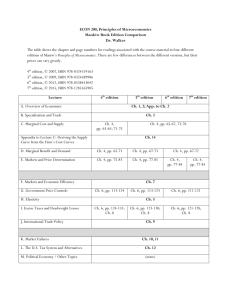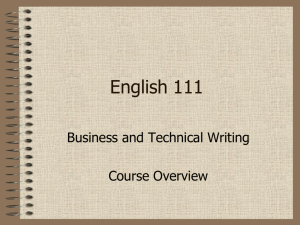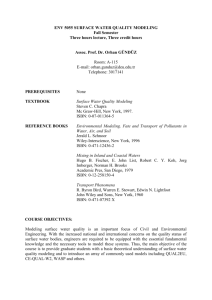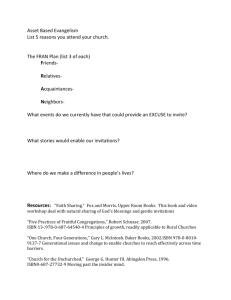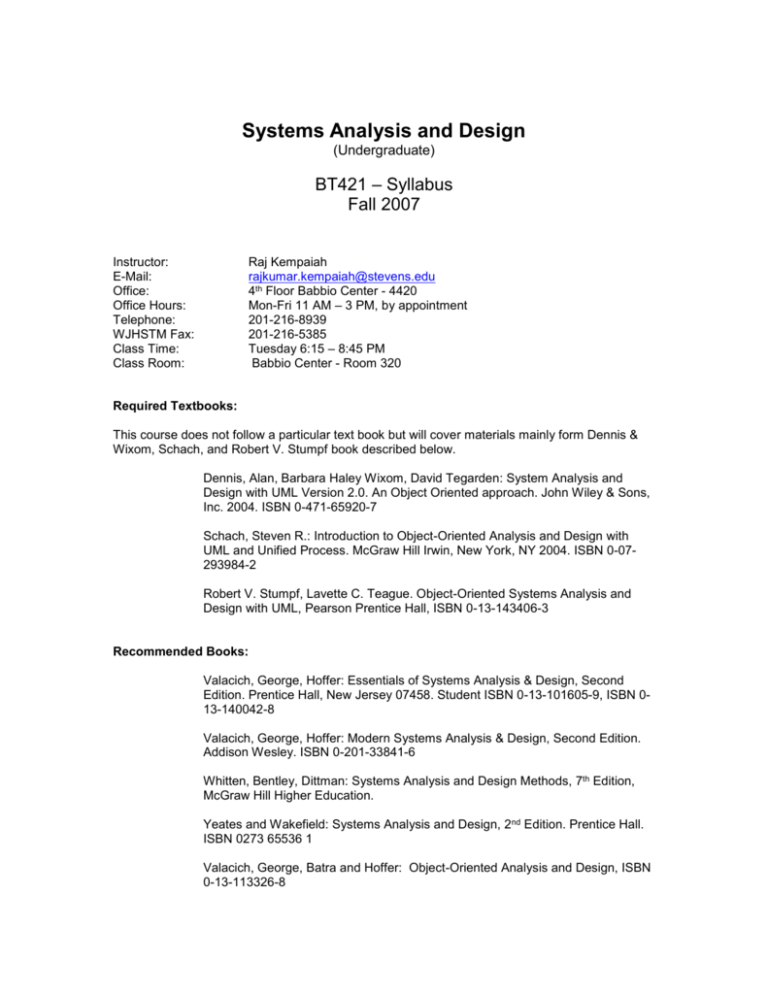
Systems Analysis and Design
(Undergraduate)
BT421 – Syllabus
Fall 2007
Instructor:
E-Mail:
Office:
Office Hours:
Telephone:
WJHSTM Fax:
Class Time:
Class Room:
Raj Kempaiah
rajkumar.kempaiah@stevens.edu
4th Floor Babbio Center - 4420
Mon-Fri 11 AM – 3 PM, by appointment
201-216-8939
201-216-5385
Tuesday 6:15 – 8:45 PM
Babbio Center - Room 320
Required Textbooks:
This course does not follow a particular text book but will cover materials mainly form Dennis &
Wixom, Schach, and Robert V. Stumpf book described below.
Dennis, Alan, Barbara Haley Wixom, David Tegarden: System Analysis and
Design with UML Version 2.0. An Object Oriented approach. John Wiley & Sons,
Inc. 2004. ISBN 0-471-65920-7
Schach, Steven R.: Introduction to Object-Oriented Analysis and Design with
UML and Unified Process. McGraw Hill Irwin, New York, NY 2004. ISBN 0-07293984-2
Robert V. Stumpf, Lavette C. Teague. Object-Oriented Systems Analysis and
Design with UML, Pearson Prentice Hall, ISBN 0-13-143406-3
Recommended Books:
Valacich, George, Hoffer: Essentials of Systems Analysis & Design, Second
Edition. Prentice Hall, New Jersey 07458. Student ISBN 0-13-101605-9, ISBN 013-140042-8
Valacich, George, Hoffer: Modern Systems Analysis & Design, Second Edition.
Addison Wesley. ISBN 0-201-33841-6
Whitten, Bentley, Dittman: Systems Analysis and Design Methods, 7th Edition,
McGraw Hill Higher Education.
Yeates and Wakefield: Systems Analysis and Design, 2nd Edition. Prentice Hall.
ISBN 0273 65536 1
Valacich, George, Batra and Hoffer: Object-Oriented Analysis and Design, ISBN
0-13-113326-8
Course Overview
This course covers the analysis and development of systems to meet the growing
demands for information in the organizations. Students will learn how to analyze systems
development life cycle, analysis and design techniques, information systems planning and project
identification and selection, requirements collection and structuring, process modeling, data
modeling, design of interface and data management, system implementation and operation,
system maintenance, and change management implications of systems. It looks at current
methods and tools such as rapid application development, prototyping, and computer-aided
software development (CASE). Procedure models like the waterfall model, spiral, and prototyping
approaches as well as the rational unified process are examined in detail.
Grading policy
Grading Elements
Weekly Assignments
Midterm
Grade Weights
30.0%
30.0%
Final Exam
30.0%
Student Reliability/Participation
10.0%
Weekly Assignments
Every week you will be given assignment based on the class discussion. Write clearly and proof
read your submissions. You can either submit it electronically or in printed form. Grade for late
submissions will be reduced by 20% if turned in later than class date.
Your graded assignment will be returned to you in two weeks.
Exams
Exams will be a combination of questions and problem solving exercises. It will cover the
materials from class discussions, assigned readings, weekly assignments and so forth.
Student Attendance/Participation
Attendance and Participation are important aspect of the class. If you miss a class you
have to do all the work including the assignments. You are expected to participate in the
classroom discussions and therefore come prepared with any questions you might have or your
understanding and viewpoints on the readings.
Email
When sending e-mail to the instructor, in the ‘subject’ line indicate BT421 followed by the
topic. Also, include your full name so we know who you are when we respond. If you are
attaching any document make sure you scan for the viruses before you send them. Any
document found to have virus will be deleted and there will be a penalty imposed.
Ethical Conduct
Enrollment into the undergraduate program at Stevens Institute of Technology signifies a
student’s commitment to the Stevens Honor System. It is the responsibility of each student to
become acquainted with and uphold the ideals set forth in the Honor System Constitution.
References
Ackoff, Russell L.: A System of System Concepts. Management Science 17 (1971) 11, pp. 661671.
Alvarez, Rosío; Urla, Jacqueline: Tell me a good story: Using narrative analysis to examine
information requirements Interviews during an ERP implementation.ACM SIGMIS Database 33
(2002) 1, pp. 38-52.
Butler, Kelley L.: The Economics of Software Process Improvement. Online Paper at
http://www.stsc.hill.af.mil/crosstalk/1995/07/Economic.asp July 1995.
Curtis, Bill; Kellner, Marc I.; Over, J.: Process Modeling. Communications of the ACM 35 (1992)
9, pp. 75-90.
Ewusi-Mensah, K.: Critical issues in abandoned information systems development projects.
Communications of the ACM, 40(1997) 9, pp. 74-80.
Herbsleb, James; Carleton, Anita; Rozurn, James; Siegel, Jane; Zubrow, David: Benefits of
CMM-based Software Improvement: Initial Results. Technical Report CMU/SEI-94-TR-013,
Carnegie Mellon University, Pittsburgh, PA 1994.
Hoffer, A.: When Will the Rubber Hit the Road for Web Services. eAI Journal, October 2002, pp.
8-11.
Humphrey, W. S.: Characterizing the Software Process: A Maturity Framework. IEEE Computer,
21 (1988) 3, pp. 48-56.
Kruchten, P. (2001). What is the Rational Unified Process. The Rational Edge January 2001
Markus, M. L., & Keil, M. (1994). If We Build It, They Will Come: Designing Information Systems
That People Want to Use. Sloan Management Review, 35(4), pp. 21-31.
Paulk, M. C.; Curtis, B.; Chrissis, M. B.; Weber, C. V.: The Capability Maturity Model for Software.
IEEE Software 10 (1993) 4, pp. 18-27.
Reifer, D.; Chatmon, A.; Walters, C. D.: The Definitive Paper: Quantifying the Benefits of
Software Process Improvement. Software Tech News 5 (2000) 4. Online Paper at:
http://www.dacs.dtic.mil/awareness/newsletters/stn5-4/definitive.html
Sassone, P.G.; Schwartz, A.P.: Cost-Justifying OA. Datamation, 32 (1986) 4, pp. 83-84.
Sassone, P.G.: Cost Benefit Analysis of Information Systems: A Survey of Methodologies. ACM
Conference on Supporting Group Work (SIGGROUP) 1988, pp. 126-133.
zur Muehlen, M.: Process Modeling Methods - An Overview. White Paper. Stevens Institute of
Technology. Hoboken, NJ 2002.

